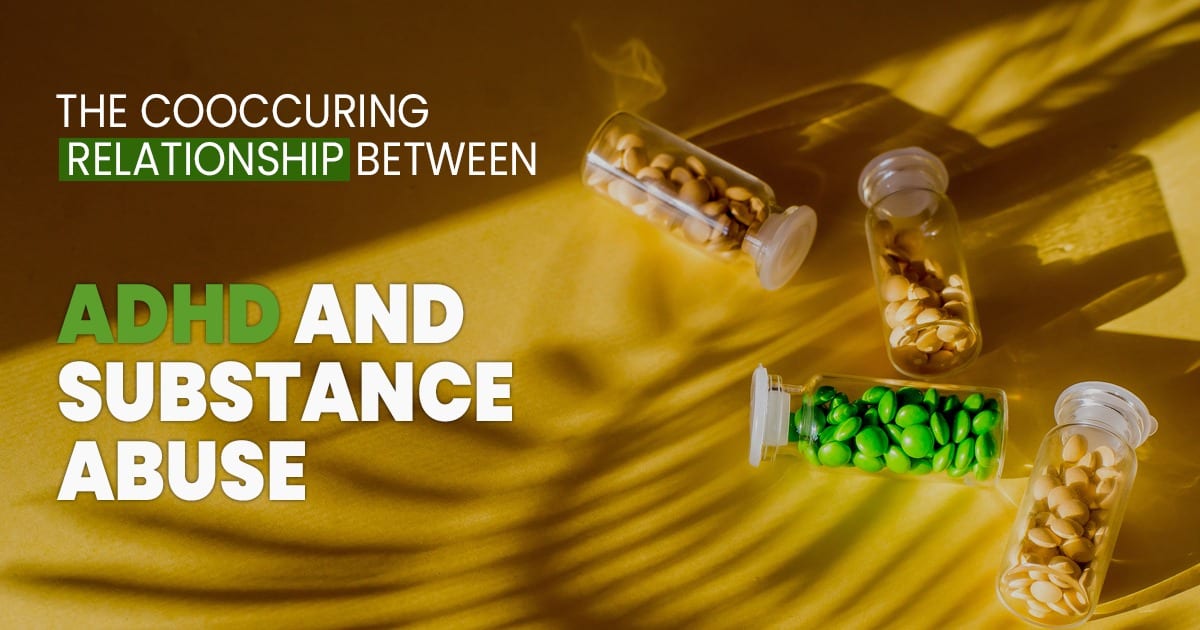
There is commonly a relationship between Attention Deficit Hyperactivity Disorder (ADHD) with substance abuse disorder. According to the National Institutes of Mental Illness, when someone has a mental health disorder along with a substance use disorder, it’s called a co-occurring disorder. Co-occurring disorders can begin simultaneously, but more commonly, one might appear before the other.
In the case of ADD/ADHD, it’s usually present before someone develops a substance use disorder.
What Are ADD and ADHD?
ADD stands for Attention Deficit Disorder, and ADHD stands for Attention Deficit Hyperactivity Disorder; both disorders are considered subtypes of one condition.
The term ADD is somewhat outdated, and you’ll most often hear these conditions referred to generally as ADHD.
According to the Centers for Disease Control and Prevention (CDC), there are around 6.4 million children with ADHD diagnosed with it in the United States, according to the Centers for Disease Control and Prevention (CDC), making this condition one of the most common childhood mental disorders.
Types of ADHD
Some variations of the disorder are:
- Inattentive
- Hyperactive
- Impulsive
- Combined
- Adult
Inattentive
With the inattentive type, a child may specifically have problems focusing; symptoms for this particular subtype include:
- Distracted easily
- Forgetful
- Not able to pay attention to details
- Trouble staying on-task
- Doesn’t follow instructions
- Disorganized
Hyperactive/Impulsive
Symptoms of this type of ADHD can include:
- Excessive talking
- Squirms or fidgets
- Moves around in inappropriate situations
- Has a hard time staying quiet
- Interrupts others
- Experiences difficulties waiting their turn

Combined
The combined subtype of ADHD symptoms includes both inattention as well as hyperactivity/impulsivity.
Adult
Most adults who have ADHD had it since childhood, but it might not have been diagnosed until they were older. Symptoms of ADHD in adults can include:
- Being easily distracted
- Not paying attention to details
- Some may have hyperfocus, meaning they delve so much into a project that they lose awareness of what’s happening around them
- Disorganization
- Problems with time management, such as often showing up late
- Forgetfulness
- Impulsivity
- Shifts in mood
- Negative self-image
- Lack of motivation
- Anxiety
- Restlessness
- Fatigue
- Problems in relationships
Along with the symptoms above, adults with attention deficit disorder are also more likely to experience substance abuse, including alcohol and tobacco, and other illegal drugs.
What Are the Symptoms of Substance Abuse?
Some of the symptoms of substance abuse can overlap with ADHD symptoms. That can make a diagnosis of one or both conditions more challenging. Symptoms of addiction can include:
- Urges or cravings to use a substance
- A single-minded focus on getting and using the substance
- Developing a tolerance and needing higher doses to get the same effects
- Regularly taking more of a substance than intended
- Financial difficulties that arise because of spending on drugs or alcohol
- Continual use of the substance despite adverse side effects and outcomes
- Engaging in risky behaviors while on the drug, or to get more of it
- Not being able to stop using the substance
- Experiencing withdrawal symptoms if cutting back or trying to quit
If someone is dealing with addiction, the people around them may see more outward manifestations. These can include:
- Problems at work or school
- Failing to meet obligations in daily life
- Physical health issues such as weight loss
- Not caring about grooming or physical appearance
- Changes in behavior
- Being secretive
- Problems with money
Why Are People with ADHD At Higher Risk of Substance Abuse and Addiction?
It’s estimated that more than 25% of adolescents with substance use disorders also fit the criteria for ADHD. Around the same percentage of adults who seek treatment for drug or alcohol abuse also have ADHD.
There are so many factors that can play a role in the links between ADHD and substance abuse, some of which are explored below.
Underlying Vulnerability
One theory as to why people with ADHD are more likely to develop substance use disorders is because both conditions are considered disinhibition disorders; when someone doesn’t have inhibitions, they are more likely to be impulsive in their behaviors. Impulsivity leads to risky behaviors, and that can include using substances.
Children, throughout their lifetime, are significantly more likely to try different substances than people without ADHD.

The brain of someone with ADHD can be wired to seek out new experiences because of their impulsivity. That means that not only could they be more likely to use substances, but their brain could move toward full-blown addiction more quickly.
Dealing with the Effects of ADHD
When a child or adult struggles with ADHD, it can have profound effects on their life, including overall quality of life. Someone with ADHD may struggle with relationships and in situations like school or work. It may be overwhelming for them to keep up with the demands of their daily responsibilities.
They may feel like they’re different from other people, or they may feel like they aren’t achieving what they’d like to because of ADHD. These negative feelings can impact self-esteem and can make someone more likely to use substances.
Self-Medication
In some ways, self-medication was touched on above, but it can also be talked about on its own. When someone is dealing with ADHD symptoms, they may find that it’s hard for them to calm down or relax, which can lead to self-medication with substances.
For example, if someone with ADHD often feels restless or as if their mind is racing, they might use a depressant like marijuana or alcohol to deal with the symptoms. Someone with ADHD could also self-medicate to improve anxiety, sleep, focus, or depression.
Do ADHD Medicines Contribute to Substance Abuse Problems?
There are some theories that the use of ADHD medicines like Adderall and Ritalin could themselves create an addiction risk. While amphetamine and methylphenidate are potentially addictive, most people with ADHD who take these drugs as prescribed are less likely to abuse them than people without ADHD.
When someone has ADHD symptoms and takes their medicine as prescribed, it doesn’t create that same high as it does in someone who’s recreationally abusing the drug. Research is increasingly showing that it may lower their risk of substance abuse when someone takes their ADHD medicine as prescribed.
Substance Abuse Treatment with Co-Occurring Disorders
For someone who has both ADHD and a substance abuse disorder, they may require long term treatment for both co-occurring disorders. When someone has a co-occurring disorder, dual diagnosis treatment is critical. If a person isn’t treated for both conditions, then there’s a higher likelihood of relapse. Once a dual diagnosis has been established, co-occurring disorders require specialized treatment that tends to be more in-depth.
Dual diagnosis treatment addresses the mental, physical and social factors of addiction and the mental health disorder. Dual diagnosis treatment may include a combination of behavioral therapies in both individual and group settings. The therapist might use medication as well.
The big takeaway is that while people with ADHD are more likely to have substance use disorders, treatment can work when it deals with both issues separately and their relationship to one another.
Anchored Tides Recovery is a safe place for women with co-occurring mental health issues, along with addiction issues, can heal. Call us today, find comfort and start to build your support group, one woman at a time.































